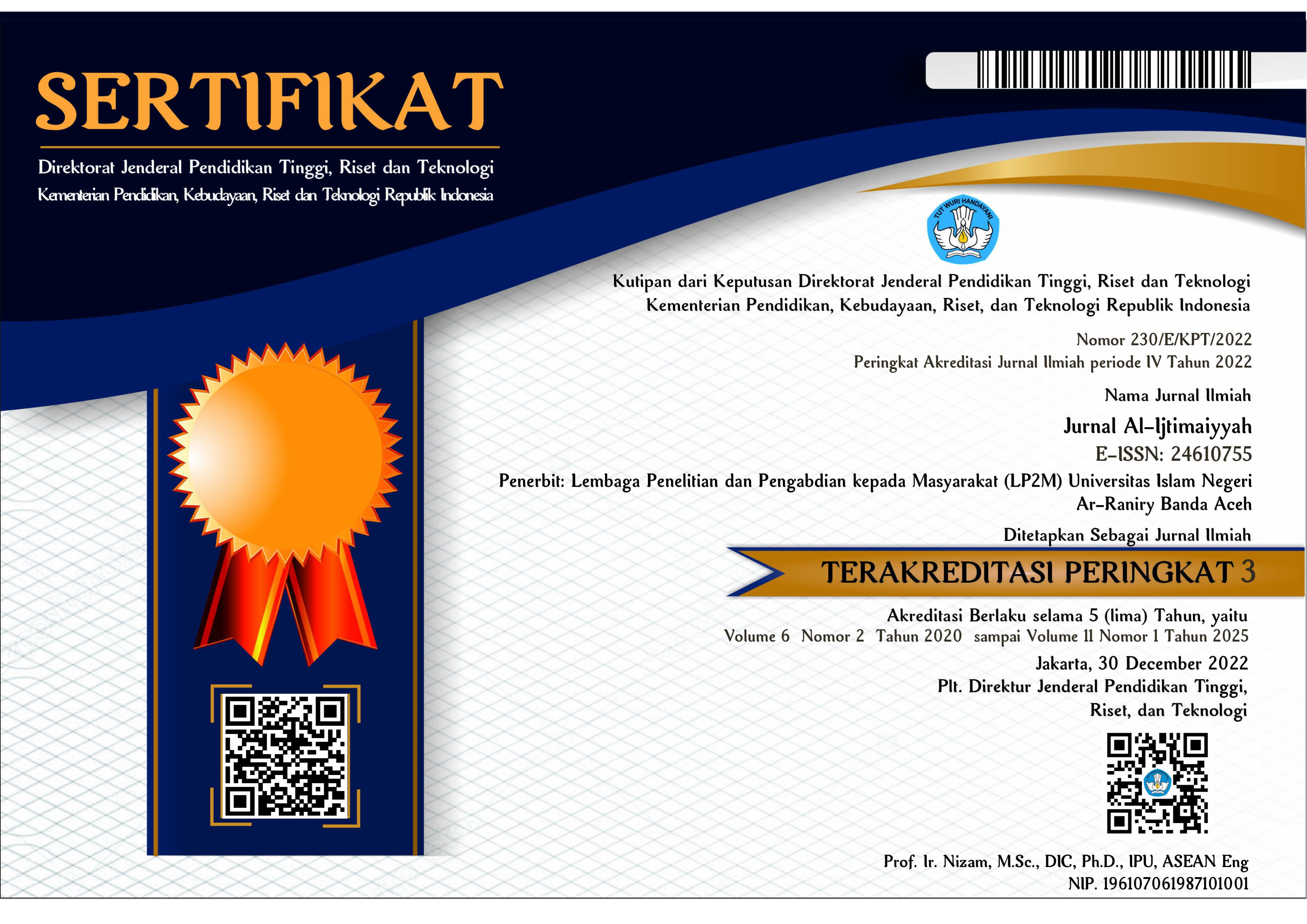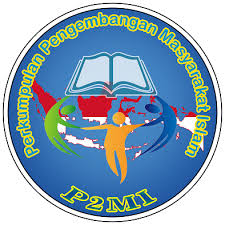POST-TRAUMATIC GROWTH AMONG TSUNAMI SURVIVORS: THE IMPACT OF PROBLEM-FOCUSED COPING ON LONG-TERM RECOVERY
DOI:
https://doi.org/10.22373/al-ijtimaiyyah.v11i1.29509Keywords:
Post-Traumatic Growth, Problem-Focused Coping, Disaster SurvivorAbstract
The 2004 Indian Ocean tsunami caused catastrophic damage in Aceh-Indonesia, leaving profound psychological impacts on survivors. This study examines the long-term role of problem-focused coping in predicting post-traumatic growth (PTG) among 145 adult survivors who lost close family members. Using the Post-Traumatic Growth Scale and the Problem-Focused Coping Scale, the results show that problem-focused coping significantly predicts PTG, accounting for 52.34% of the variance (p < 0.001). Survivors who employed active, constructive coping strategies displayed greater growth, meaning-making, and personal development nearly two decades after the trauma. These findings underscore the enduring significance of adaptive coping and the importance of incorporating culturally grounded values into post-disaster mental health interventions.Downloads
References
Alhuwailah, A., Khodabakhsh, M. R., & Khamis, F. (2021). Religion, coping, and mental health: A study among Muslim trauma survivors. Journal of Religion and Health, 60(1), 122–136. https://doi.org/10.1007/s10943-020-01120-w
Budianto, A. (2020). Religious coping and resilience among Muslim disaster survivors in Indonesia. Journal of Religion and Health, 59(3), 1451–1466. https://doi.org/10.1007/s10943-019-00880-3
Delcea, C., Rad, D., Toderici, O.F., & Bululoi, A.S. (2023). Post-traumatic Growth, Maladaptive Cognitive Schemas and Psychological Distress in Individuals Involved in Road Traffic Accidents—A Conservation of Resources Theory Perspective. Healthcare, 11.
Drapeau, C.W., Lockman, J.D., Moore, M., & Cerel, J. (2019). Predictors of Post-traumatic Growth in Adults Bereaved by Suicide. Crisis, 40 3, 196-202.
Echeburúa, E., & Amor, P.J. (2019). Memoria traumática: estrategias de afrontamiento adaptativas e inadaptativas. Terapia psicológica.
Eisenbeck, N., Carreno, D. F., & Pérez-Escobar, J. A. (2021). Meaning-centered coping in the COVID-19 pandemic: Direct and moderating effects on depression, anxiety, and stress. Journal of Happiness Studies, 22(1), 41–60. https://doi.org/10.1007/s10902-020-00218-3
Eissenstat, S.J., Kim, S., & Kim, B. (2022). A Meta-Study of Post-traumatic Growth and Coping Strategies. Psychological Reports, 127, 1588 - 1612.
Fino, E., Martino, G., & Lombardi, E. (2021). Predictors of posttraumatic growth in the aftermath of the COVID-19 pandemic: The role of resilience and meaning-focused coping. Journal of Loss and Trauma, 26(8), 722–732. https://doi.org/10.1080/15325024.2020.1867076
Hanprasertpong, J., Sookprasert, A., & Sirirat, S. (2023). Coping strategies and posttraumatic growth among Thai breast cancer survivors. Asian Pacific Journal of Cancer Prevention, 24(1), 177–183. https://doi.org/10.31557/APJCP.2023.24.1.177
Kalaitzaki, A. (2021). Posttraumatic growth in response to COVID-19 pandemic: The role of meaning in life, resilience and coping strategies. Psychological Trauma: Theory, Research, Practice, and Policy, 13(4), 448–455. https://doi.org/10.1037/tra0000946
Lazarus, R. S & Folkman, S. (1984). Stress, appraisal, and coping. New York: Springer
Li, Y., Zhang, X., & Wang, L. (2023). The influence of deliberate rumination on post-traumatic growth: The mediating role of psychological resilience. Frontiers in Public Health, 11, 1043402. https://doi.org/10.3389/fpubh.2023.1043402
Littleton, H., Axsom, D., & Grills-Taquechel, A. (2025). Post-traumatic growth, coping, and distress: A systematic review of the literature. Traumatology, 31(1), 1–14. https://doi.org/10.1080/15325024.2025.2487483
Meilianda, E., Safrida, S., & Direzkia, A. (2017). Recovery and reconstruction planning after the 2004 tsunami in Aceh, Indonesia. International Journal of Disaster Risk Reduction, 21, 312–319. https://doi.org/10.1016/j.ijdrr.2016.12.012
Olonilua, O., & Aliu, J. O. (2025). Reviewing the critical role of coping strategies in enhancing mental health and resilience in disaster survivors. Environmental Research: Health, 3(1), 025006. https://doi.org/10.1088/2673-4533/3/1/025006
Seaton, C. L., Oelke, N. D., & Berg, J. (2021). Decolonizing mental health services in disaster response: A scoping review. International Journal of Environmental Research and Public Health, 18(7), 3702. https://doi.org/10.3390/ijerph18073702
Shakespeare-Finch, J., Bowen, R., & Martin, S. (2022). A systematic review of longitudinal studies examining posttraumatic growth in adults. Trauma, Violence, & Abuse, 23(4), 1110–1124. https://doi.org/10.1177/1524838020976088
Smith, J., Walker, D., & Thompson, R. (2020). Coping strategies and post-trauma recovery in disaster-affected communities: A study of Banda Aceh. Journal of Trauma & Resilience, 34(2), 112-126.
Schneider, M., Hernandez, A., & Tan, P. (2020). Coping in the aftermath of natural disasters: The role of problem-focused coping. Psychological Science and Practice, 15(4), 87-100.
Tedeschi, R. G., & Calhoun, L. G. (1996). The post-traumatic growth inventory: Measuring the positive legacy of trauma. Journal of Traumatic Stress, 9(3), 455-471
Tedeschi, R. G., Park, C. L., & Calhoun, L. G. (1998). Post-traumatic growth: Positive change in the aftermath of crisis. Mahwah, NJ: Lawrence Erlbaum Associates.
Tedeschi, R. G., Shakespeare-Finch, J., Taku, K., & Calhoun, L. G. (2018). Posttraumatic growth: Theory, research, and applications. Routledge. https://doi.org/10.4324/9781315527433
Uğuz, Ö., & Cam, M.O. (2022). The Effect of Coping with Stress and Perceived Social Support on Post-traumatic Growth in Transplant Recipients. SSRN Electronic Journal.
Wilson, H. (2024). The role of psychological resilience in post-disaster recovery: A review of existing literature. SSRN. https://ssrn.com/abstract=5189285
Xie, C., & Kim, Y. (2022). Post-Traumatic Growth during COVID-19: The Role of Perceived Social Support, Personality, and Coping Strategies. Healthcare, 10.
Xiuji. (2017). Longitudinal Relationships between Social Support and Post-traumatic Growth among Adolescent Survivors of the Wenchuan Earthquake. Journal of Frontier in Psychology. 05. doi.org/10.3389/fpsyg.2017.01275
Downloads
Published
Issue
Section
License
Copyright (c) 2025 Siti Hajar Sri Hidayati, Muhana Sofiati Utami

This work is licensed under a Creative Commons Attribution-ShareAlike 4.0 International License.
Authors who publish in Jurnal Al-Ijtimaiyyah agree to the following terms:
- Authors retain copyright and grant the journal right of first publication with the work simultaneously licensed Attribution-ShareAlike 4.0 International (CC BY-SA 4.0) that allows others to share the work with an acknowledgment of the work's authorship and initial publication in this journal.
- Authors are able to enter into separate, additional contractual arrangements for the non-exclusive distribution of the journal's published version of the work (e.g., post it to an institutional repository or publish it in a book), with an acknowledgment of its initial publication in this journal.
- Authors are permitted and encouraged to post their work online (e.g., in institutional repositories or on their website) prior to and during the submission process, as it can lead to productive exchanges, as well as earlier and greater citation of published work. (See The Effect of Open Acces)









